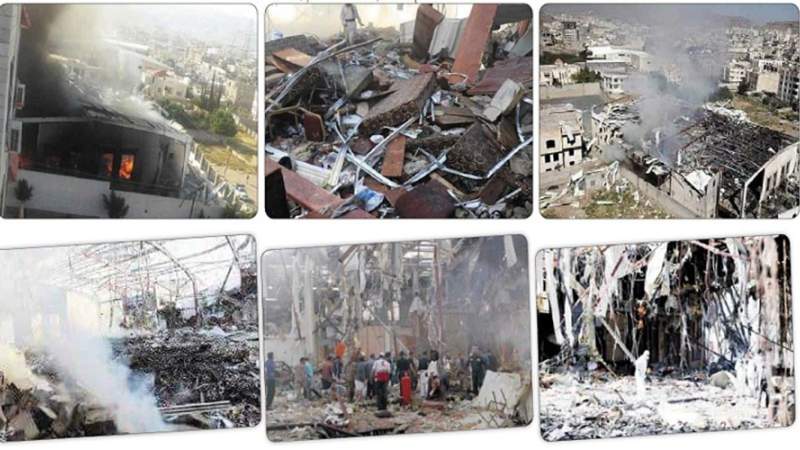Nine Years On: The Great Hall Massacre Remains Etched in Yemen’s Memory

News - Yemen: Nine years have passed since one of the deadliest massacres in Yemen’s modern history — the bombing of the Great Hall in Sana’a by the US-Saudi-Zionist aggression — yet the horror and grief remain deeply embedded in the hearts of Yemenis.
The attack, which took place on October 8, 2016, killed and wounded more than a thousand civilians who had gathered to offer condolences, marking one of the darkest days in the ongoing war of aggression on Yemen.
The massacre came exactly one year after another atrocity — the bombing of a wedding in Sanban, Dhamar Province, on October 9, 2015 — when aggression warplanes targeted a home filled with wedding guests, killing over 50 civilians, including women, children, and the newlyweds themselves. The two crimes, separated by only a year, symbolize the brutality and moral collapse of the US-Saudi aggression that has waged war on Yemen since 2015.
On that fateful day in 2016, as thousands gathered to mourn the death of Sheikh Ali al-Ruwaishan, father of then–Interior Minister Major General Jalal al-Ruwaishan, the Saudi-led coalition launched a series of airstrikes on the packed funeral hall.
The bombardment left a scene of unimaginable devastation — bodies charred beyond recognition, limbs scattered, and survivors burned or suffocated by toxic fumes from US-made munitions.
Among the martyrs was the former Mayor of Sana’a, Abdul Qader Hilal, alongside numerous military and civilian leaders. The attack was condemned internationally as a blatant war crime.
Human Rights Watch later confirmed that the bombs used were US-made laser-guided Paveway II GBU-12 munitions, weighing 225 kilograms, and that the strike met all criteria for a war crime under international humanitarian law.
The atrocity triggered a rare wave of global outrage, with the United Nations, human rights organizations, and numerous states issuing condemnations. Even the coalition itself admitted to the strike under public pressure, calling it a “mistake” and promising investigations that never materialized.
Legal experts stress that accountability for war crimes against civilians is a core principle of international law and human rights conventions. Yet, as analysts note, the current global order — dominated by hegemonic powers such as the United States and Britain, both direct participants in the Yemen war — has rendered real justice elusive.
Their veto power within international bodies like the UN Security Council shields them from prosecution and obstructs any meaningful path toward justice for Yemeni victims.
Some international jurists point to the possibility of pursuing cases under the principle of universal jurisdiction in certain European courts. However, the obstacles remain formidable, particularly due to the diplomatic immunities enjoyed by state officials responsible for war crimes.
For Yemenis, the massacres of Sanban and the Great Hall remain indelible scars — symbols of the cruelty of the aggression and the resilience of a nation that continues to resist. Despite years of silence from the so-called international community, the memory of these atrocities stands as lasting testimony to the crimes of the US-Saudi-Zionist coalition and the suffering it has inflicted upon the Yemeni people.
The Great Hall Massacre occurred amid the height of the US-Saudi-Zionist campaign against Yemen, which has killed and injured hundreds of thousands of civilians, destroyed infrastructure, and imposed a devastating blockade. The incident exposed the coalition’s indiscriminate tactics and deepened global awareness of the human cost of the war — a tragedy Yemenis vow never to forget.
-
09:48
Almasirah correspondent in Sa'adah: An African migrant was injured by direct fire from the Saudi enemy army near Al-Sheikh in the Munabbih border district
09:08
Al-Farh: Arab and Islamic regimes must confront Zionist schemes and US projects before they target everyone
09:07
Al-Farh: Washington aims to redraw global influence, targeting even its allies
09:06
Al-Farh: Turkey, Egypt, Pakistan, and Saudi Arabia likely to be next targets, regardless of ties with Washington or the Zionist entity
09:02
Al-Farah: Iran is a cornerstone of the Islamic world, and any attempt to overthrow its system would open the door to targeting other Islamic systems





